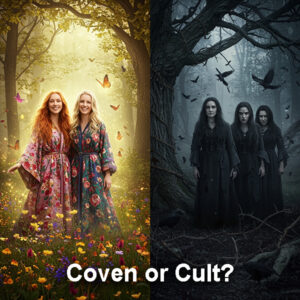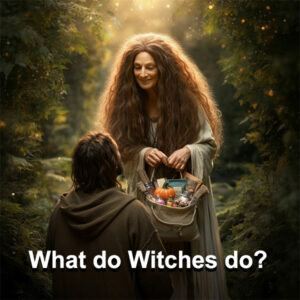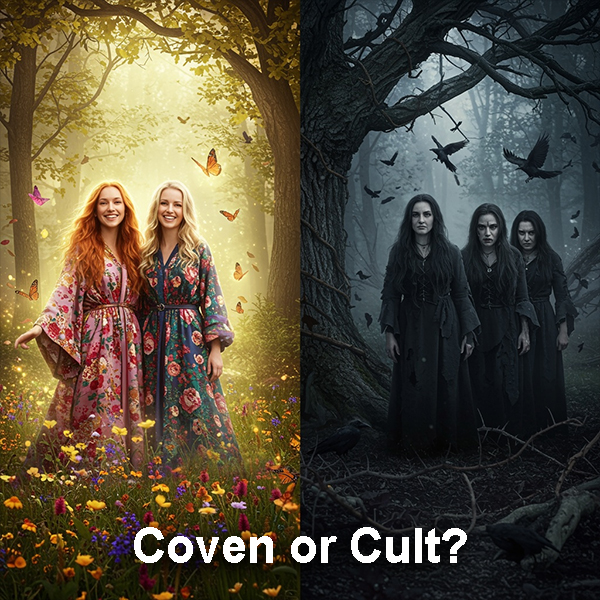 If you are new to witchcraft, perhaps just starting out on your path, you might ponder joining a witches coven or circle. Let me tell you that a road can be filled with painful potholes, and sometimes devastating. It’s not all bad though, if you can learn to navigate and know what you truly want and align yourself with that. A coven can be and should be family, some of the dearest friends you’ll ever have.
If you are new to witchcraft, perhaps just starting out on your path, you might ponder joining a witches coven or circle. Let me tell you that a road can be filled with painful potholes, and sometimes devastating. It’s not all bad though, if you can learn to navigate and know what you truly want and align yourself with that. A coven can be and should be family, some of the dearest friends you’ll ever have.
Here, my intention is to give you some tools for making choices about the company you keep (or don’t).
Obviously, a solitary witch is a sole practitioner, and nothing wrong with that. However, sometimes we want more, to share experiences and increase learning. That’s where covens and circles come in.
A circle is like a looser form of a witches coven. A small group of friends engaging in magical projects and learning, taking turns teaching at times. There is often one or two that are facilitators, helping put the activities together. But no one is beholden to another in such a group. Think of it more like an informal study group and social club. Connect with us for more on Instagram, Facebook (Meta) or TikTok.
A coven can take many forms, have any number of members and can all have different rules or philosophies. The main differences are types of witches, culture, structure, leadership and goals.
Group Formation – Circles or Witches Covens F.N.S.P.
Sometimes a circle or witches coven can grow into a cult over time. But sometimes it’s not about turning into a cult, it’s more about high drama. Here are four stages of group formation and you’ll see where the drama comes in. The following applies to both covens and circles.
- Forming – This is the basic “let’s get together”, a group forms for a purpose. The purpose may not be clearly defined and is likely to evolve over time. But yes, basically a group of at least somewhat like-minded people forms.
- Norming – In this stage, everyone in the group is getting to know everyone else in the group. We present our “normal” selves as does everyone else. We observe behavior, idiosyncrasies, habits, etc. We get an idea of how people “normally” are. This is also where drama begins to unfold. Having no clear rules, goals or purpose, some may balk at exercises, lessons or discussions. In the norming phase, we are also getting an idea of people’s character, integrity, honor etc. Just as they are getting an idea of ours. This is where feathers can really get rubbed the wrong way.
- Storming – This is where the drama gets quite evident. People start vehemently expressing who and what they don’t like. For some, they don’t register on the “totem pole” where they want to, desiring a higher place. “Pecking order” becomes an issue. People demand respect, rather than earn it. Often there are active falling-out situations. Sometimes situations outside of the group, but still involving its members affect the group.
- Performing – This is after the fallout, at last you have a handful of reasonable people, of like-mind, with similar goals. Now the group can go on to perform at a higher level.
Evaluating a Witches Coven: Red and Green Flags
If anyone can start a witches coven just by reading a book, then students must take charge of their education. A seeker who has explored modern witchcraft should recognize warning signs. However, some red flags are easy to overlook. Here’s a list of red and green flags to help you assess if a group has shifted from “coven” to “cult.” Or if a prospective group is already behaving like one.
When approaching or being approached by a coven, think of it like a first date. Maintain healthy boundaries and leave quickly if red flags appear.
Red Flags – Identifying Coven Issues:
Restricting Information
If the group insists on avoiding certain books, ideas, or people, consider this a major red flag. A genuine teacher embraces knowledge, even if it contradicts their views. Some teachers prohibit students from reading specific books or visiting websites because the content challenges their authority. A healthy spiritual leader never dictates friendships.
In my own witches coven, I encourage reading occult books. Sometimes I let a member know I personally don’t approve of a book but hey, read it for yourself and make up your own mind. Never do I tell my members what deities to worship, except for who we call upon when we gather. I also never force any member to participate in anything against their conscience.
Never do I teach them what is good or evil, only how to think – never what to think. I provide mental constructs, exercises, philosophies and encourage them to make up their own mind about such things. I also never tell my members who they can or cannot be friends with. Sometimes I ask them to consider the optics. or “politics” Mostly, I seek to keep them from harm or being dragged into ugliness. My reasoning is also to protect the community work we do for the homeless, we can’t do it if we ourselves are a mess.
If your leadership isn’t teaching you to serve something besides leadership without restriction, that should be a huge red flag. Sometimes it takes the form of “you don’t get this until you give me that” too. Again, a leader doesn’t ask to be served, but serves their members to the best of their capacity.
Persecution Complex
Cults often create an “enemy” to blame for their struggles. If a group frequently discusses who they despise, this may indicate deep-seated biases. Consider what kind of people they truly are. That doesn’t mean that sometimes you and your people don’t have an actual enemy either. Sometimes you do, sad but true.
Having a metaphysical shop in addition to a witches coven, we are often the target of some toxic or jealous folk. They behave like enemies, yes, and so in some cases we treat them as such. But this is not being persecuted, simply egos, materialism and greed at work.
In the reverse, and I’m firm about it, when someone chooses to leave the coven, they do so with our blessings. No cursing, no hexing, just peaceful partings. Personally, I never treat anyone like an enemy until they choose to behave like one. Even then, it’s more about protection and “return to sender” type work.
Besides, people need time, don’t they? Time to discover what is or isn’t for them, what they really want. I’ve instructed coven members to leave and go iron out life-stuff for a good six months to a year and rejoin down the road if they wish. A poor, insecure leader is going to blow a gasket every time someone leaves. It need not be that way.
That also doesn’t mean there aren’t actual “oath breakers”. It is explained and given that what goes on in coven stays there. From the witch-work to the recipes and any other activity. Sometimes, but always over bulls__t reasons, someone leaves your group and will break that oath. That’s why the power of silence and discretion are so important. Have wisdom about who you share what with. Members and leaders must exercise wisdom and caution always.
Leadership: Are You Being Served?
 Now, I can only speak for myself here. As head of my coven, I serve. I see to my members education and practice. Yes, our coven has goals, but they are private and everyone’s on board. It takes proficient witches to meet those goals. When we gather for witch-work, lessons or making goods, I cook. Yes, I feed them all and provide experiences. In short, I serve them, I look out for them.
Now, I can only speak for myself here. As head of my coven, I serve. I see to my members education and practice. Yes, our coven has goals, but they are private and everyone’s on board. It takes proficient witches to meet those goals. When we gather for witch-work, lessons or making goods, I cook. Yes, I feed them all and provide experiences. In short, I serve them, I look out for them.
I don’t look at it as “ruling” but serving instead and passionately avoid “my way or no way at all” type thinking.
Far too many have I seen in leadership roles in the pagan community (including witches covens) seeking adulation, validation, demanding respect. I have been there holding hands, wiping up tears, getting some through financial or other crisis, fears – you name it, but I serve. To me, one significant mark of a healthy or unhealthy group is the leadership.
Isolation, (next), leadership (above) and persecution (above) all apply to members too. It is my express desire that members help and serve one another. Leadership is important no matter whether someone is leading in some official capacity or not. It is most important to lead by example too.
When it comes to members; Is the leader calling them out in front of group, embarrassing or attempting to use group pressure to ensure conformity? There is a big difference between group encouragement and group pressure. My approach is to always reach out to them privately and gently. Remember a coven should be family and some of the closest friends you could ever have. Treat them as such. A leader’s style of leading and their empathy, compassion and level of care should demonstrate it.
Isolation
Many cults limit outside contact or only engage externally to spread their ideology. In cults, members are often encouraged—sometimes subtly—to distance themselves from critics. This isolation can take the form of group pressure rather than explicit orders. Over time, members adopt the cult’s worldview, making them more vulnerable to manipulation. This is why I encourage group discussions. I have members pair up to tackle activities and exercises.
Sexual Control
Pagan history, as with Christian history, is filled with cases of sexual coercion under the guise of spiritual practice. Some witches covens and other groups pressure students into sexual relationships, claiming it follows an “ancient tradition.” These claims often mask abusive dynamics. No legitimate teacher should demand or reward sexual activity. When authority is involved, consent becomes questionable. Ethical leaders ensure power imbalances do not lead to exploitation. Sexual workings should occur only between equals, not within imbalanced power structures. Thankfully, this is an issues that never presents in our coven. I am not about to tell people who they can and cannot have sex with. Not that we can’t cover sex magic like other topics, but as far as coven participation, that’s off the table – one less headache or thing to worry about.
Green Flags – Signs of a Healthy Coven
Transparency
A healthy witches coven operates openly with its members. Leadership decisions and group policies should be clear, including any fees or obligations. While some esoteric knowledge may be reserved for higher ranks, leadership actions should never be hidden. Mistakes and flaws should not be concealed. I teach my coven to question everything, ask questions, get clarification and to talk among themselves.
Inclusivity
A supportive group encourages members to maintain relationships outside the coven. Healthy leaders welcome outside perspectives, even from critics. They do not vilify former members or restrict interactions with them. Access to various sources of information should be encouraged, not forbidden. That’s not to say a former member might be a toxic individual, and call a spade a spade. A person’s actions and choices should speak loudly enough, don’t you think?
Final Considerations
If you recognize one red flag in your group, it may be heading toward cult-like behavior. Two red flags suggest serious concerns, while three or more indicate a strong likelihood of cult dynamics. Stay aware, trust your instincts, and always walk your path in freedom.






I think the whole debate between covens and cults is overblown. Cant we all just agree that everyone has the right to practice their beliefs peacefully? Lets focus on unity instead of division.
Agree to disagree. Some beliefs are harmful and should be called out. Unity doesnt mean tolerating everything.
Thank you. This was very informative. This will help so many by helping them know what they are walking into.
🙂 Thank you, yes – many are not aware of what they may be getting into. Look before you leap, get to know people well before making decisions with consequences. Blessings.
I hear this question to many times. Do you have to be in a coven to do strong magic? When they leave a coven they feel like they are a target?
Good questions Megan 🙂 First, you can do strong magic without being part of a group; circle or coven. That being said, I get the apprehension, anxiety or fear too. However, in a healthy group more can be done magically speaking and fosters/facilitates greater learning, or at least it should. And there is the matter of fellowship, healthy friendships and sharing energy. I always tell my coven if someone chooses to leave they do so with our blessings, no cursing, no hexing. We wish them well until they choose to behave like an enemy. I don’t know about you, but I have far better things to do with my time than focus on that. Good reasons to leave would be that person being on a different path, not being ready, and often life is happening and they need to handle life before engaging in a coven or circle.
I think the whole debate about witches covens being cults is ridiculous! Its just a group of like-minded individuals coming together to practice their beliefs. Lets not jump to conclusions based on stereotypes.
Actually, many cults start as groups of like-minded individuals. Lets not dismiss potential dangers.
I think we should stop using the terms coven and cult altogether. Lets embrace diversity in how witches gather and practice. Its time to move beyond labels and focus on unity within the community.
Respect traditions and choice. Labels can hold significance. Unity doesnt have to erase diversity.
I think the distinction between a coven and a cult is fascinating! Its all about intention and power dynamics, right? But what if a coven starts showing red flags – should we call it out or give them the benefit of the doubt?
If it was me, I would gently call it to someone’s attention, but best to talk about such things early on (in my opinion) because the longer the behavior goes on, the harder to break it or break from it. But that’s just me.
I think the distinction between a coven and a cult is intriguing. Its important to evaluate the red and green flags within a group formation. Restricting information can be a slippery slope, leading to a persecution complex.